Related Research Articles

Francis Ford Coppola is an American film director, producer, and screenwriter. He is considered one of the leading figures of the New Hollywood film movement of the 1960s and 1970s and is widely considered one of the greatest directors of all time. He is the recipient of five Academy Awards, six Golden Globe Awards, two Palmes d'Or, and a British Academy Film Award (BAFTA).
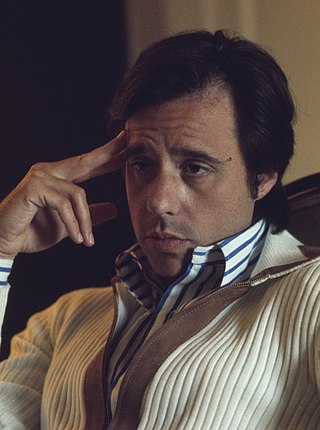
Peter Bogdanovich was an American director, writer, actor, producer, critic, and film historian. He started his career as a film critic for Film Culture and Esquire before becoming a prominent filmmaker as part of the New Hollywood movement. He received accolades including a BAFTA Award and Grammy Award, as well as nominations for two Academy Awards and two Golden Globe Awards.

An independent film, independent movie, indie film, or indie movie is a feature film or short film that is produced outside the major film studio system in addition to being produced and distributed by independent entertainment companies. Independent films are sometimes distinguishable by their content and style and how the filmmakers' artistic vision is realized. Sometimes, independent films are made with considerably lower budgets than major studio films.

William David Friedkin was an American film, television and opera director, producer, and screenwriter who was closely identified with the "New Hollywood" movement of the 1970s. Beginning his career in documentaries in the early 1960s, he is best known for his crime thriller film The French Connection (1971), which won five Academy Awards, including Best Picture and Best Director, and the horror film The Exorcist (1973), which earned him another Academy Award nomination for Best Director.

Targets is a 1968 American crime thriller film directed by Peter Bogdanovich in his theatrical directorial debut, and starring Tim O'Kelly, Boris Karloff, Nancy Hsueh, Bogdanovich, James Brown, Arthur Peterson and Sandy Baron. The film depicts two parallel narratives which converge during the climax: one follows Bobby Thompson, a seemingly ordinary and wholesome young man who embarks on an unprovoked killing spree; the other depicts Byron Orlok, an iconic horror film actor who is disillusioned by real-life violence and is contemplating retirement.
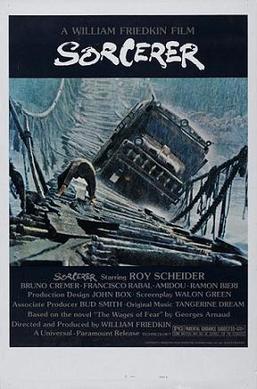
Sorcerer is a 1977 American action-thriller film directed and produced by William Friedkin and starring Roy Scheider, Bruno Cremer, Francisco Rabal, and Amidou. The second adaptation of Georges Arnaud's 1950 French novel Le Salaire de la peur, it has been widely considered a remake of the 1953 film The Wages of Fear, although Friedkin disagreed with this assessment. The plot depicts four outcasts from varied backgrounds meeting in a South American village, where they are assigned to transport cargoes of aged, poorly kept dynamite that is so unstable that it is 'sweating' its dangerous basic ingredient, nitroglycerin.
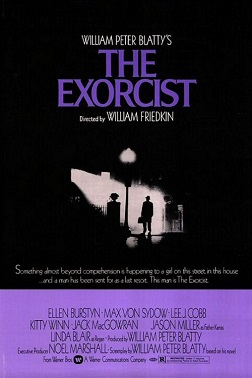
The Exorcist is a 1973 American supernatural horror film directed by William Friedkin from a screenplay by William Peter Blatty, based on his 1971 novel. The film stars Ellen Burstyn, Max von Sydow, Jason Miller, and Linda Blair, and follows the demonic possession of a young girl and her mother's attempt to rescue her through an exorcism by two Catholic priests.

Paper Moon is a 1973 American road comedy-drama film directed by Peter Bogdanovich and released by Paramount Pictures. Screenwriter Alvin Sargent adapted the script from the 1971 novel Addie Pray by Joe David Brown. The film, shot in black-and-white, is set in Kansas and Missouri during the Great Depression. It stars the real-life father and daughter pairing of Ryan and Tatum O'Neal as protagonists Moses and Addie.

They All Laughed is a 1981 American romantic comedy film directed by Peter Bogdanovich and starring Ben Gazzara, Audrey Hepburn, John Ritter, Colleen Camp, Patti Hansen, and Dorothy Stratten. The film was based on a screenplay by Bogdanovich and Blaine Novak. It takes its name from the George and Ira Gershwin song of the same name.
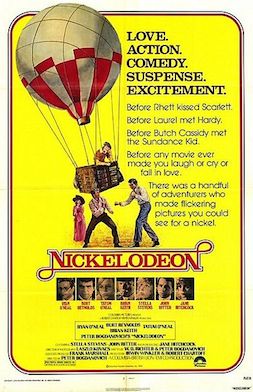
Nickelodeon is a 1976 American comedy film directed by Peter Bogdanovich, and stars Ryan O'Neal, Burt Reynolds and Tatum O'Neal. According to Bogdanovich, the film was based on true stories told to him by silent film directors Allan Dwan and Raoul Walsh. It was entered into the 27th Berlin International Film Festival.
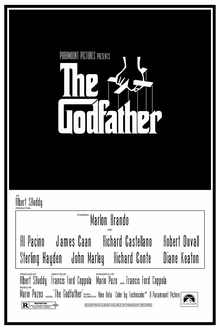
The Godfather is a 1972 American epic crime film directed by Francis Ford Coppola, who co-wrote the screenplay with Mario Puzo, based on Puzo's best-selling 1969 novel of the same title. The ensemble cast includes Marlon Brando, Al Pacino, James Caan, Richard Castellano, Robert Duvall, Sterling Hayden, John Marley, Richard Conte, and Diane Keaton. It is the first installment in The Godfather trilogy, chronicling the Corleone family under patriarch Vito Corleone (Brando) from 1945 to 1955. It focuses on the transformation of his youngest son, Michael Corleone (Pacino), from reluctant family outsider to ruthless mafia boss.
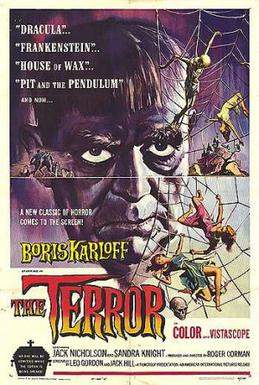
The Terror is a 1963 American independent horror film produced and directed by Roger Corman. The film stars Boris Karloff and Jack Nicholson, the latter of whom portrays a French officer who is seduced by a woman who is also a shapeshifting devil.

Mikey and Nicky is a 1976 American crime drama film written and directed by Elaine May. It stars John Cassavetes as a desperate small-time mobster and Peter Falk as his longtime, childhood friend. The supporting cast features Ned Beatty, Carol Grace, Rosee Arrick, and noted acting teacher Sanford Meisner.

Easy Riders, Raging Bulls: How the Sex-Drugs-and-Rock 'N Roll Generation Saved Hollywood is a book by Peter Biskind, published by Simon & Schuster in 1998. Easy Riders, Raging Bulls is about the 1960s and 1970s Hollywood, a period of American film known for the production of such films such as The Godfather,The Godfather Part II,The French Connection,Chinatown,Taxi Driver,Jaws,Star Wars,The Exorcist, and The Last Picture Show. The title is taken from films which bookend the era: Easy Rider (1969) and Raging Bull (1980). The book follows Hollywood on the brink of the Vietnam War, when a group of young Hollywood film directors known as the "movie brats" are making their names. It begins in the 1960s and ends in the 1980s.
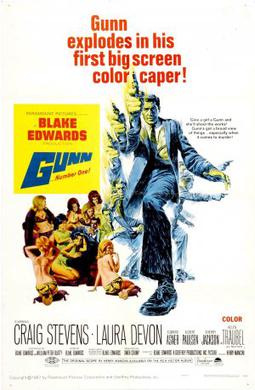
Gunn is a 1967 American neo noir mystery film directed by Blake Edwards, and starring Craig Stevens, based on the 1958-1961 television series Peter Gunn. Stevens was the only regular cast member from the original series to appear in the film; the characters of Gunn's singing girlfriend Edie Hart, club owner "Mother", and police lieutenant Jacoby were all recast for the film. The movie was intended to be the first in a projected series of Peter Gunn feature films, but no sequels followed.

Where's Jack? is a 1969 British adventure film recounting the exploits of notorious 18th-century criminal Jack Sheppard and London "Thief-Taker General" Jonathan Wild.

The Great Gatsby is a 1974 American historical romantic drama film based on the 1925 novel of the same name by F. Scott Fitzgerald. The film was directed by Jack Clayton, produced by David Merrick, and written by Francis Ford Coppola. It stars Robert Redford, Mia Farrow, Sam Waterston, Bruce Dern, and Karen Black. The plot concerns the interactions of writer Nick Carraway with enigmatic millionaire Jay Gatsby (Redford) and Gatsby's obsession to reunite with his former lover, Daisy Buchanan (Farrow), amid the riotous parties of the Jazz Age on Long Island near New York City.
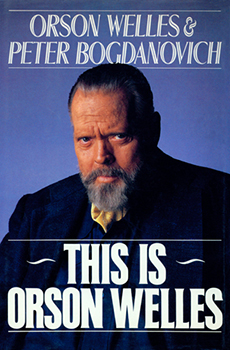
This is Orson Welles is a 1992 book by Orson Welles and Peter Bogdanovich that comprises conversations between the two filmmakers recorded over several years, beginning in 1969. The wide-ranging volume encompasses Welles's life and his own stage, radio, and film work as well as his insights on the work of others. The book was edited after Welles's death, at the request of Welles's longtime companion and professional collaborator, Oja Kodar. Jonathan Rosenbaum drew from several incomplete drafts of the manuscript and many reel-to-reel tapes, most of which had already been transcribed. Much of the dialogue, however, had been rewritten by Welles, often in several drafts.

Daisy Miller is a 1974 American drama film produced and directed by Peter Bogdanovich, and starring Cybill Shepherd in the title role. The screenplay by Frederic Raphael is based on the 1878 novella of the same title by Henry James. The lavish period costumes and sets were done by Ferdinando Scarfiotti, Mariolina Bono and John Furniss.
Peter Bogdanovich (1939–2022) was an American film director, screenwriter, producer, actor and film historian whose career spanned over fifty years.
References
- ↑ The Directors Company at Everything2.com
- 1 2 3 "William Friedkin, The Friedkin Connection: A Memoir, Harper Collins 2013 p 314-318".
- ↑ "3 FILMS ANNOUNCED BY DIRECTORS GROUP". New York Times. Sep 6, 1972. p. 40.
- ↑ Alex Simon, "Peter Bogdanovich", The Hollywood Interview accessed 16 April 2013
- 1 2 Peter Bart, "Three's Company", Variety, 6 December 2004, accessed 16 April 2013
- ↑ John Gallagher, "Between Action and Cut", August 2004 Archived 2012-12-06 at the Wayback Machine accessed 3 June 2013
- ↑ "William Friedkin: Exorcising Joe!", Bizarre Mag 16 April 2013
- ↑ "IMDb, The Conversation" . Retrieved 6 July 2014.
- ↑ "Boxofficemojo" . Retrieved 6 July 2014.